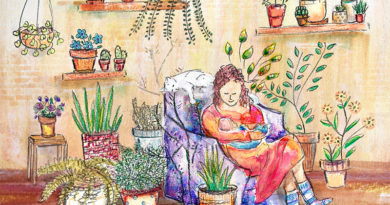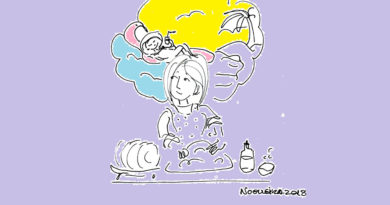The Culture of Caring
Supposing there is a gene for caring, I don’t have it. If I wasn’t quite sure before kids, I definitely know now – at least when it comes to all the thankless, menial labour that comes along with having three kids to tend to.
I’m quite aware of the implications this may have for me not only as a mother, but also as a person, or maybe even more so as a woman! Although I would like to point out that this has nothing to do with how I feel about my kids – I love them to bits. I love listening to my eight-year-old singing herself to sleep after story and cuddle time. I loved when they were all little and we made up “imagine” games and sang songs and danced together. (Seriously – board games like Ludo/Parcheesi aren’t games meant to take you away from everyday drudgery!)
I never liked going to playgrounds unless I got a go at the swing too, which was fine as long as they were babies, but then it all became about doing it “by my wown,” meaning they wanted to sit on the swings alone. And where is the fun in pushing a swing for hours or worrying back and forth under the fiddly rope construction like I’m being attacked by a swarm of bees, in case they fall? (I can safely say that I am aware of the physical and psychological benefits to a child’s development of such activities, which is precisely why this part of their education is delegated to their father.) But the times I did end up on the playground (after all, my partner was working full time and I was only working part time), I found there was time to think and wonder – was there something wrong with me?
I did have postnatal depression after our first child – had that affected me? Or perhaps it was a fear of responsibility that made me unable to care sufficiently and this was partly responsible for my postnatal depression?
One of my former bosses had once exclaimed how happy she was that her girls were no longer babies – how she’d hated those baby years. She said this without any sign of guilt or regret, and this helped me. It meant that it was a question of character. But surely there was more to it than that.
I remember watching a sandpit bully jump on all the tunnels and sand-pies the other toddlers had made or another small boy running around wildly hitting everyone and everything with his red plastic spade, even pushing a little girl over. The mothers just sat by, shrugging their shoulders. “Boys will be boys,” they said, with a proud smirk on their faces. Certainly, everyone’s entitled to an opinion. But my instinct is to stop the kid even if it isn’t my own, mostly because I think maybe his mother’s on the toilet. But every time I did stop such a child, I was met with an angry parent who told me that it was none of my business. This was much to the astonishment and dismay of my expat friends who, like me, would stop their own children if they were hurting others.
So caring is also culturally defined. We are taught how to behave as carers. A conversation I had with a mother on a playground in the village my parents had moved to made this even clearer to me. Things are changing in Switzerland now, but even only ten years ago when my boy was little, this woman was obviously quite displeased when I mentioned that I was working part-time (granted this was in canton Basel-Land, not the city). I mentioned that I thought it was important for the kids’ social development to spend time in a day care with their peers from an early age (not disregarding the fact that it also gave me some space for myself), and she practically walked away. But not before she made it quite clear that her kids got home-cooked meals and they were taken care of by herself or her mother – no strangers would be getting near her children!
I stuck to my expat friends. Even though they could up and leave at any given time, it was what I’d experienced as an expat child, albeit with my own mother being Swiss, and maybe for that reason it made the most sense to me.
Now I see clearly that these are all examples of cultural differences, and this brings me back to the question: if defining how you care is socially conditioned, then who’s to say I can’t define how I care for my kids in my own way?
Living in-between cultures gives me a certain amount of freedom (you can always blame the other culture!), because I do care. I’d just like to do it in my “wown” (minimal) way and on my terms, without risking judgement that one way is better than any other.
I still think that every child should come with a nanny, but we’ll leave that for now: it’s time for walkies – for our dog, not for the kids. The poor darlings will be tired after a day at school and they’ll want to “chill” in front of the telly before dinner magically “appears”….
By Karin Mohler
Karin has lived between cultures for her entire life and has come to the conclusion that this will always be a big part of her. Having no roots doesn’t bind her anywhere in particular, but she is careful not to impose that sense upon her children, who have been born and bred in Switzerland. She has taken a lot of inspiration for understanding her “in-betweenness” from the book Third Culture Kids: Growing Up Among Worlds, by D. C. Pollock and R. V. Reken (2009).
Illustration by Susana Gutierrez
Susana is the mother of two little girls and a freelance illustrator. She can be reached at s.escapa@gmail.com





So true. When I first got to Switzerland some 25 years ago, working mothers were VERY uncommon. Even part time. Compared to France, where children begin preschool at about age three, Swiss kids generally did not get much socialization with other kids until kindergarten. And if the teacher was sick, the kids might be sent home. Surprise!